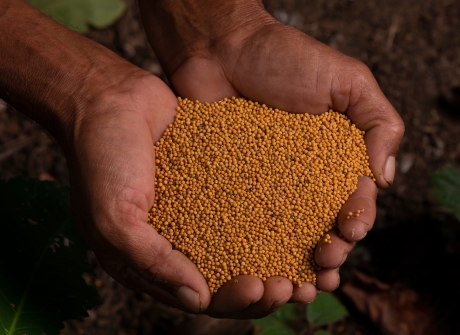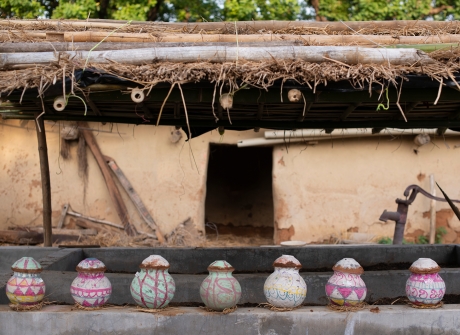
Community seed banks facilitate the exchange and storage of local crop varieties. ©FAO/Pankaj Paul
Millets grow well in Bihar, a state in eastern India, but farmers stopped cultivating the crop and lost its seeds. “We have forgotten about some crops,” says 27-year-old Pudi Soren. “When we were children, we saw crops such as finger millets too, but people stopped their cultivation for many years,” she recounted.
Actually, over the past two decades, communities in central and eastern Indian states had largely abandoned the cultivation of oilseeds, pulses and small grains such as millets due to trends and other pressures. This led to a loss of the seeds and knowledge of how to grow them. But the decline in their cultivation contributed to serious malnutrition and loss of genetic diversity in the area.
Farmers in Pudi’s area each used to harvest a single type of crop during the monsoon season.“There are problems that we face as smallholder farmers. Rainfall is reducing. And when there is little rainfall, like this year, irrigation becomes expensive,” Pudi stated, describing how the changing climate has affected her farming.
When once again, it didn’t rain enough in the monsoon season in Bihar and the wells went dry, Pudi had to travel to the riverside to grow crops, such as chickpeas and rice, that provide necessary calories and sustenance in the winter months.
But one crop that she could plant near her home this season was finger millet. Finger millet doesn’t require a lot of water to grow. It needs very little fertilizer, and it is full of protein.

Pudi recently started growing these crops again from seeds she initially received from a Benefit-sharing Fund project in India, administered by the International Treaty on Plant Genetic Resources of the Food and Agriculture Organization of the United Nations (FAO) and implemented by the non-profit organisation, Public Advocacy Initiatives for Rights and Values in India.
“My husband and I have a small piece of land, but we did not grow much previously, because we lacked the necessary resources,” describes Pudi, and avers, “Three years ago, the project gave us seeds and encouraged us to do farming. Now I am proud to be a farmer… Thankfully, finger millets can be grown with less water”.

The community seed bank is key to ensuring farmers’ timely access to seeds without having to travel far. With the launch of five community seed banks, the project contributes to diversifying locally grown crops. It also serves as a training centre and a meeting place for farmers to work together with scientists from nearby agricultural universities. Farmers learn how to grow crops sustainably and how to save seeds for future seasons. They also participate in trials to select seeds that best cater to their needs and preferences.
“We get seeds from millets, amaranth, lentils, mustard and pigeon peas from our nearby community seed bank. We return the seeds after harvesting. Many more people have become interested in different types of crops after seeing us. The areas where people grow pulses, oilseeds and millets are expanding in our village,” explains Pudi.
Retrieving seeds from seed banks and growing these forgotten crops also saves them money. “In the past, we bought oil, wheat and pulses from the market and spent 500 to 600 rupees every month. Our expenses have been halved since we started cultivating these crops. I use the money for the education of my children,” explains Pudi.
Pudi values the many advantages that millets bring her. “We can grow finger millet in the rice fallow season and summer, and they do not need fertilizers; some cow dung is sufficient. It is a good source of protein in our meals, and my children like the biscuits that I make with the flour.”
She adds: “What I grow sustains my family, but in the future, I want to sell my surplus on the market… I hope that projects like the one I am participating in with the Benefit-sharing Fund will continue to support farmers in my village and farmers around the world.”
To date, the Benefit-sharing Fund project has returned the in situ cultivation and conservation of 94 varieties of 42 crops. The project aims to reach a total of 1 250 farmers, mostly women, from rural communities in central and eastern Indian states. 250 farmers will receive seeds from the five seed banks that have been established through this project, while a further 1 000 farmers will benefit from the technical capacity building through workshops, Farmer Field Schools, knowledge exchange, information materials and visits.
Pudi continues to promote the saving, sharing and caring for seeds, like millets, that may have been forgotten but are of global importance. In September 2022, she addressed the International Treaty Governing Body, where 150 countries and more than 400 participants were present, to share her experience and stress the significance of reviving the use of forgotten seeds and having access to crops that grow well locally. FAO stated that this type of support that the Benefit-sharing Fund supplies, is the linchpin to resilient and bountiful livelihoods.
Source: the FAO News and Media office, Rome
– global bihari bureau





